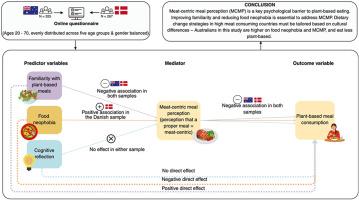Understanding the barriers to plant-based dietary change: The role of meat-centric meal perception among adults in Australia and Denmark
IF 3.8
2区 医学
Q1 BEHAVIORAL SCIENCES
引用次数: 0
Abstract
Facilitating sustainable dietary transitions is crucial for addressing the climate crisis, yet changing individual eating behaviours – particularly in meat-centric food cultures – remains challenging. This study examines different psychological factors underlying plant-based eating, with a focus on meat-centric meal perception - the tendency to view meat as the essential component of a proper meal. Data were collected via an online questionnaire from 592 meat-eating adults aged 20 to 70 (evenly recruited across five age groups) in Australia (N = 325) and Denmark (N = 267), two of the world's highest meat-consuming countries. Participants completed validated measures of familiarity with plant-based meals, food neophobia, cognitive reflection, and meat-centric meal perception. A more meat-centric meal perception was correlated with consuming fewer plant-based meals in Australia r(323) = - 0.36, p < 0.001 and Denmark r(265) = - 0.42, p < 0.001. Mediation analyses showed that higher familiarity with plant-based meals was associated with a less meat-centric meal perception, which in turn was related to higher plant-based eating among Australians (indirect effect = 0.34, 95 % CI [0.183, 0.534]) and Danes (indirect effect = 0.45, 95 % CI [0.267, 0.673]). Food neophobia was associated with lower plant-based eating in both countries, with an additional negative indirect effect via meat-centric meal perception in Denmark. Cognitive reflection showed no significant association with either meal perception or plant-based eating. These findings highlight meat-centric meal perception as a key psychological barrier to plant-based eating and underscore the importance of familiarity and food neophobia in shaping meal perceptions, offering valuable insights for promoting sustainable dietary change.

了解以植物为基础的饮食改变的障碍:澳大利亚和丹麦成年人中以肉类为中心的膳食感知的作用。
促进可持续饮食转型对于应对气候危机至关重要,但改变个人饮食行为——特别是在以肉类为中心的饮食文化中——仍然具有挑战性。本研究考察了植物性饮食背后的不同心理因素,重点关注以肉类为中心的饮食观念——将肉类视为适当膳食的重要组成部分的倾向。数据通过在线问卷收集,来自澳大利亚(N = 325)和丹麦(N = 267)的592名20至70岁的食肉成年人(平均分为五个年龄组),这两个国家都是世界上吃肉最多的国家。参与者完成了对植物性膳食、新食物恐惧症、认知反射和以肉为中心的膳食感知的熟悉程度的验证措施。在澳大利亚,以肉类为中心的饮食观念与较少的植物性饮食相关r(323) = - 0.36, p
本文章由计算机程序翻译,如有差异,请以英文原文为准。
求助全文
约1分钟内获得全文
求助全文
来源期刊

Appetite
医学-行为科学
CiteScore
9.10
自引率
11.10%
发文量
566
审稿时长
13.4 weeks
期刊介绍:
Appetite is an international research journal specializing in cultural, social, psychological, sensory and physiological influences on the selection and intake of foods and drinks. It covers normal and disordered eating and drinking and welcomes studies of both human and non-human animal behaviour toward food. Appetite publishes research reports, reviews and commentaries. Thematic special issues appear regularly. From time to time the journal carries abstracts from professional meetings. Submissions to Appetite are expected to be based primarily on observations directly related to the selection and intake of foods and drinks; papers that are primarily focused on topics such as nutrition or obesity will not be considered unless they specifically make a novel scientific contribution to the understanding of appetite in line with the journal's aims and scope.
 求助内容:
求助内容: 应助结果提醒方式:
应助结果提醒方式:


